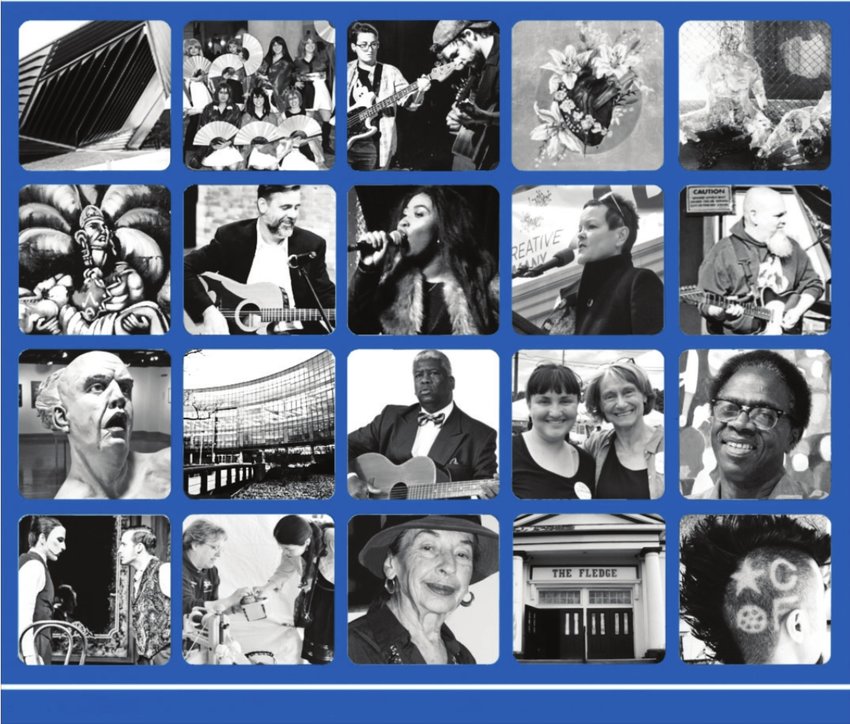
A year’s worth of artistic progress in a capital city is not easily summed up. There are many things I will likely miss, not only because so much has happened, but also because this issue marks the end of my first year as arts editor of City Pulse.
My growing pains were likely obvious as I learned the ropes, but keeping up with Lansing’s multi-faceted cultural life is a pleasure as well as a challenge. While our next issue will be looking ahead to 2019, now is a good time to look back at an eventful 2018.
Mayor Andy Schor’s Arts and Culture Commission, featuring a devoted score of local figures invested in different mediums of art, began its first series of meetings in the fall. A liaison with the city has been a long-held goal in the arts community, and the commission marks an increasingly urgent level of attention to the cultural side of Lansing from city government.
Schor also oversaw the increasingly lavish Pride rally in June for his first time in office. The day saw several thousand converge downtown in support of the LGBTQIA community in the face of sweltering humidity.
The Wharton Center continued to bring major theater productions to town, including “The Lion King” in July and the muchhyped sequel to “Phantom of the Opera,” “Love Never Dies” in October. Wharton was also able to secure the obvious crown jewel of the season, “Hamilton,” which graces the stage in May.
Controversy crept into Greater Lansing’s deep-rooted folk scene when the longstanding Great Lakes Folk Festival was uprooted by the MSU Museum in March, as part of sea change led by new director Mark Auslander. The bubbling resentment and desire to uphold the law of “the show must go on” birthed the Eastside Folklife Festival, which took place this summer at the Allen Neighborhood Center.
Despite Auslander stating Great Lakes Folk Festival would be revamped for 2019, one of the fest’s original directors, Marsha MacDowell, said the festival is “history.” While MacDowell thanked the Allen Neighborhood Center, calling the experience “fantastic,” she added that it’s unlikely Eastside Folklife will have a direct follow-up in 2019.
Regardless, the Ten Pound Fiddle nourishes the folk scene with a line of concerts and community sings has gone on strong, and will continue to do so into next year.
The Capital City Film Festival acquired some national attention as one of MovieMaker Magazine’s 25 “Coolest Film Festivals in the World.” The festival also branched out in April to include a host of live shows, including an intense performance at the Avenue Café from critically acclaimed Detroit noise rock group ADULT. The Capital City Comic-Con also saw a bump in attendance, thanks to being scheduled during MSU’s fall semester.
The MSU Broad Art Museum expanded its operation to the other side of Grand River Avenue, officially opening the long-anticipated Broad Art Lab in May. The space has given the museum opportunities to host workshops, smaller community exhibits and, finally, allowed it to dole out some of historic pieces from the fabled Kresge collection.
Art Lab’s “Open Call” has a community focus with an onsite suggestion area that asks for people to suggest new ideas for future programs.
Meanwhile, the Broad Museum itself displayed works from Andy Warhol and featured exhibits by world-renowned artists such as David Lamelas and Michael Parmentier.
Theresa Rosado’s creative space Casa de Rosado spent 2018 hosting several bold exhibits that explored marginalized identities, and subversive forms of artwork. A particular highlight was January’s “Black Velvet: A Rasquache Aesthetic,” curated by Diana Rivera and Elena Herrada, which ran a gamut of black velvet paintings done by Latinx artists in January.
“The gallery walls proved themselves to be more than a showcase of art,” Rosado said. “They’ve grown into a social platform putting forth discussions, thoughts and movements.”
Efforts to beautify Lansing through public art continued with special highlights coming from the summer ArtPath Project on the River Trail, featuring sculptures of slumped over figures made from water bottles symbolic of the Flint water crisis, the eastside Michigan Avenue mural commemorating Emil’s Restaurant and other bygone places by Brian Whitfield and the freshly unveiled Old Town mural by Nanibah Chacon.
However, the push to get a sculpture at the roundabout on Washington Square and Michigan Avenue continues to prove evasive.
A $100,000 fundraising initiative by the Capital Region Community Foundation has been put on the back burner after public consensus failed to agree on any of the four poorly received finalists that were up for consideration.
A new music venue, also dubbed a creative incubator by its management, was brought to Lansing in May – “The Fledge.”
“Thank you, Lansing, for making our brain bigger,” owner Jerry Norris said. Since May, the Fledge has helped 6 companies from the neighborhood and several non-profits get started. Community-based projects have built out garden space, an indoor pond and plant room, hundreds of pieces of art, a public computer lab, and music studios.
A much-needed alternative to the Common Ground music festival was introduced in the form of June’s Three Stacks Music Festival, put together by local booking company Fusion Shows. The focus was largely on more independent names like Against Me, Murder By Death and Screaming Females.
“It was a little lighter than we’d hoped, attendance-wise, but it felt really great, was embraced by the neighborhood and by the city, and all reviews we got were super positive,” Nate Dorough of Fusion Shows said.
“We were really proud of the lineup and the ethic, and we are definitely coming back in 2019.”
Hosted in the city streets of REO Town, Three Stacks gave us another reason to keep an eye on an increasingly bountiful neighborhood. REO Town, you are stealing the show as one of Lansing’s cultural hotspots.
Support City Pulse - Donate Today!
Comments
No comments on this item Please log in to comment by clicking here